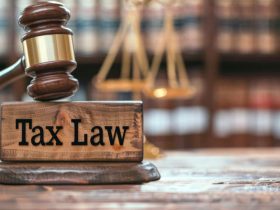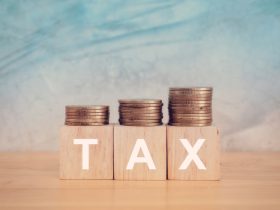What is Income Tax?
In the United Kingdom, income tax is the most common form of direct personal taxation. It is calculated as a percentage of a person’s earnings and is collected by HM Revenue & Customs (HMRC) and paid to the Treasury.
Income tax is a tax levied on money earned by individuals, for example, income from employment, interest, dividends, sale of property or other assets, operating a firm, or receiving benefits.
The UK tax rates are announced each year in the budget by the Chancellor. It usually follows three steps, no income tax for people with lower incomes, reduced rates for others, followed by higher rates for higher incomes earners.
The taxable income slabs are adjusted regularly to reflect current price levels. The Government can also offer income tax rebates to lower-income individuals at times.
Table of Content
What kinds of income are taxable?
Income includes the income you receive from a job and several state benefits, money earned as a business owner, and some forms of interest.

Not all forms of income are taxed.
You must pay income tax on the following items:
● Some government benefits, such as the State Pension and the Jobseeker’s Allowance
● Wages or salary earned by employment (including tips, bonuses, or services)
● The profit you make as a self-employed person or through the selling of services on websites or applications
● Interest income from savings that surpass the saving allowance limit
● Capital gains
● Government grants- like Self-Employed Income Support Scheme (SEISS),
● Rental income unless you are a live-in landlord and earn more than tax-free allowance
● Income from a trust
Check Our Income tax calculator UK to calculate your income tax
What is the purpose of collecting Income Tax?
HMRC collects income tax on behalf of the Government.
Income tax revenue is typically spent on public services such as the NHS, education, the healthcare system, and public initiatives such as highways, the welfare system rail, and housing.
Income Tax in the United Kingdom
In the United Kingdom, the country in which you reside decides the income tax rates you pay, as well as the authority to which you pay it. HMRC collects Income Tax in England, Wales, and Northern Ireland. You must pay Scottish Income Tax to the Scottish Government if you live in Scotland.
Anyone residing in Wales will be required to pay Welsh Income Tax to the Welsh Government.
UK Income Tax Rates 2024/25
The United Kingdom uses a “progressive tax rate” structure.
The level of tax charged rises as the amount of the individual or company’s taxable income increases.
According to the progressive tax rate system, people belonging to higher income bands must pay more taxes. After subtracting deductions and allowances, tax is usually applied to overall income.
It is an effort to make Income Tax as equitable as possible so that those who receive the most contribute the most.
England, Wales, and Northern Ireland Income tax rates 2024/25
Income Tax is payable at the following tax rates in England, Wales, and Northern Ireland:
| Tax Band | Tax Rate |
| Up to £12,570 | 0% {Personal Allowance} |
| £12,571 – £50,000 | 20% {Basic Rate} |
| £50,001 – £150,000 | 40%{Higher Rate} |
| Above£150,000 | 45% {Additional rate} |
When an individual receives more than a tax-free personal allowance (£12,570), tax is levied at the standard rate (20%) on their taxable income before they meet the basic rate cap (£50,270).
Income received above the basic rate limit is taxed at the higher rate (40%) before the taxpayer exceeds the higher rate limit of £150,000.
Following that, all income is taxable at the additional rate (45 per cent).
Scottish Income tax rates 2024/25
| Tax Band | Tax Rate |
| Up to £12,570 | 0% {Personal Allowance} |
| £12,571 – £14,667 | 10% {Starter Rate} |
| £14,668 – £25,296 | 20% {Basic Rate} |
| £25,297 – £43,662 | 21%{Intermediate Rate} |
| £43,663 – £150,000 | 41% {Higher Rate} |
| Over £150,000 | 46% {Top Rate} |
Income tax deductions are typically rendered “at source,” that is, by the paying authority (the employer) and transferred to HMRC without touching the taxpayer.
Self-employed individuals, on the other hand, must self-assess their tax obligations on an annual basis.
Taxation and tax-free allowances
Income Tax has many tax-free allowances, which means you can receive up to a certain amount before being charged.
Every year, UK tax residents are entitled to earn or receive a certain amount of taxable income tax-free. It is known as ‘Personal Allowance.’ For those born blind, a Blind Person’s Allowance is available in addition to Personal Allowance.
The Personal Allowance is the primary tax-free allowance.
The regular Personal Allowance for the 2021-22 tax year is £12,570 earlier it was £12,500 for the tax year 2020-21.
There are also other allowances for various forms of income, such as:
● The trading allowance is the first £1,000 in self-employment income.
● Dividend allowance: the first £2,000 in dividends paid on company shares.
● Rent a Room Scheme: If you rent out a room in your home, the first £7,500 in rent you receive is tax-free.
● Marriage Allowance: If your salary is less than the regular personal allowance, you can claim an allowance of £1,260 as a marriage allowance to minimize your partner’s tax.
What Is the Process for Paying Income Tax?
An individual will pay UK income tax in two ways:
1. PAYE (pay as you earn): The most popular method of paying Income Tax is by PAYE, the scheme used by employers and pension providers to deduct taxes from employees’ salaries.
2. Self-assessment: Every year, UK taxpayers who are self-employed must file a self-assessment tax return.
Income tax exemptions
In the United Kingdom, some types of income are excluded from taxes. Income tax is not levied in the United Kingdom on the following items:
● Transportation expenses associated with relocating an employee and close family to the UK at the start and end of assignments in the UK
● Winnings from pool betting, national lotteries, premium bonds or prize games
● Long-term career honours (within certain limitations)
● Individual savings accounts for UK residents with a maximum balance of £20,000, as well as income produced by funds invested in such accounts, such as interest or dividends
● Such benefits, such as those paid to war widows and dependents, as well as similar pensions payable under international laws
● Individual Savings Accounts (ISAs) or National Savings Certificates (NSCs)
● Various state benefits, including Universal Credit and Disability Living Allowance (DLA).
● A child tax credit, housing benefit, maternity allowance, work and welfare allowance, and attendance allowance are examples of social security and state benefits.
How to File an Income Tax Return in the United Kingdom
The tax year in the United Kingdom runs from 6 April of one calendar year to 5 April of the following year. It means that the current tax year is 2023/2024.
You can file your self-assessment return by post or online, but HMRC prefers that you do so online. You must first obtain a Unique Tax Reference (UTR) number. This can be seen on past tax returns and other HMRC correspondence and your online government gateway account.
Residents must inform HMRC of any changes to their tax status by 5 October following the conclusion of the relevant fiscal year. The following are the deadlines for filing UK tax returns:
- 31 October (paper tax returns)
- 31 January (online tax returns)
Read our detailed guide How to submit a self-assessment tax return
Penalties and fines
Returns submitted up to three months after the deadline are subject to a £100 fine.
A regular penalty of £10 per day could be imposed for the next three months.
If the failure lasts for more than six months after the filing date, a further fixed penalty of £300 or 5% of the tax liability is imposed (whichever is the greater).
Returns filed 12 months after the deadline are subject to additional fines, which can amount to up to 200 per cent of the tax liability in some instances.
If you don’t have all of the details you need for your UK tax return, you can use provisional figures to meet deadlines.
As soon as you have the final statistics, you can substitute any provisional statistics with them.

Winding-up
Paying taxes is mandatory for everyone, whether it is a company or an individual.
So, to get the benefit of various allowances and deductions, you can take the help of a tax accountant.
Tax accountants will assist you in keeping on top of deadlines, preparing your annual accounts and filing tax returns, as well as claiming certain tax rebates and refunds.
Hire a specialist tax advisor if you need assistance with a specific complex tax matter.












Leave a Reply